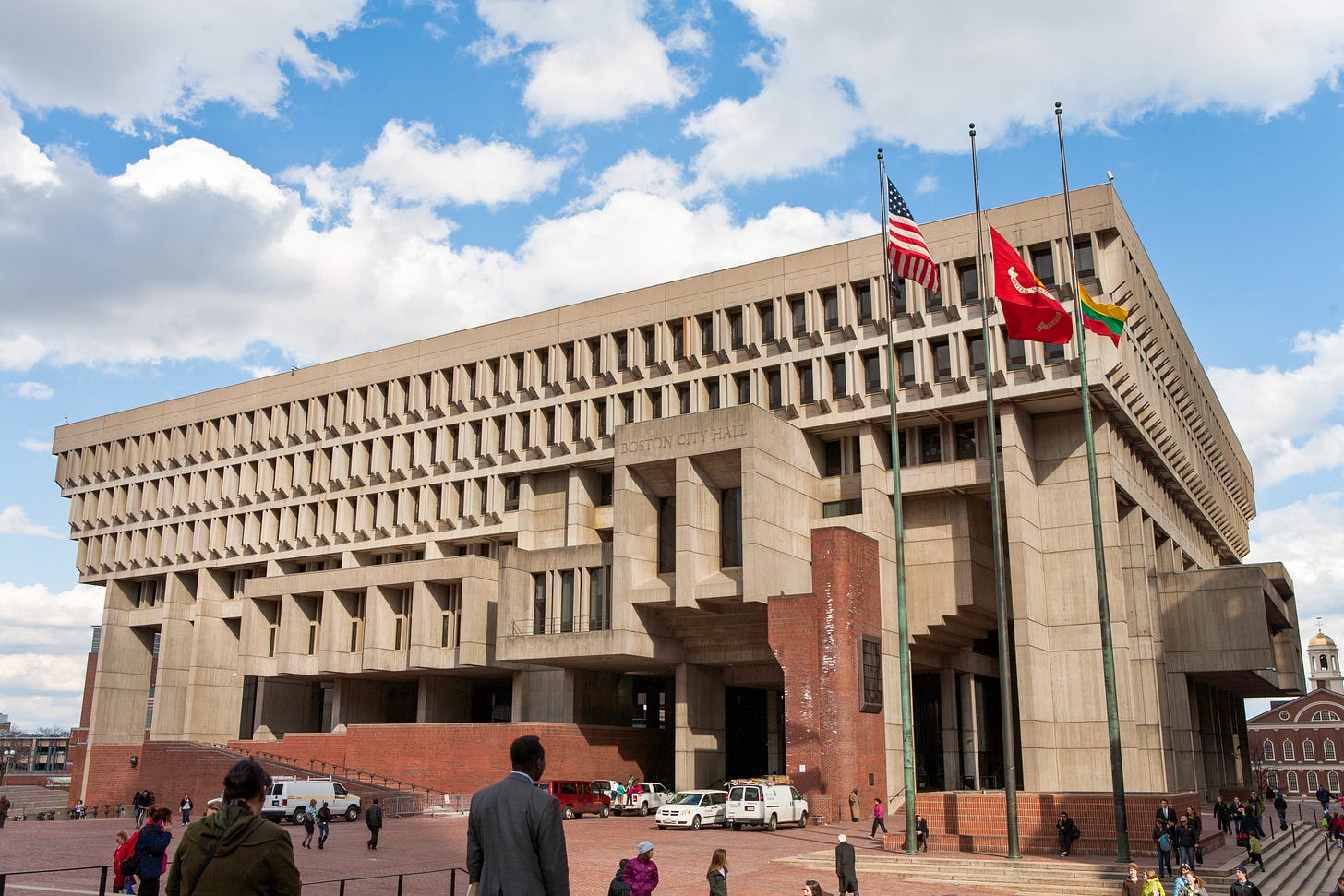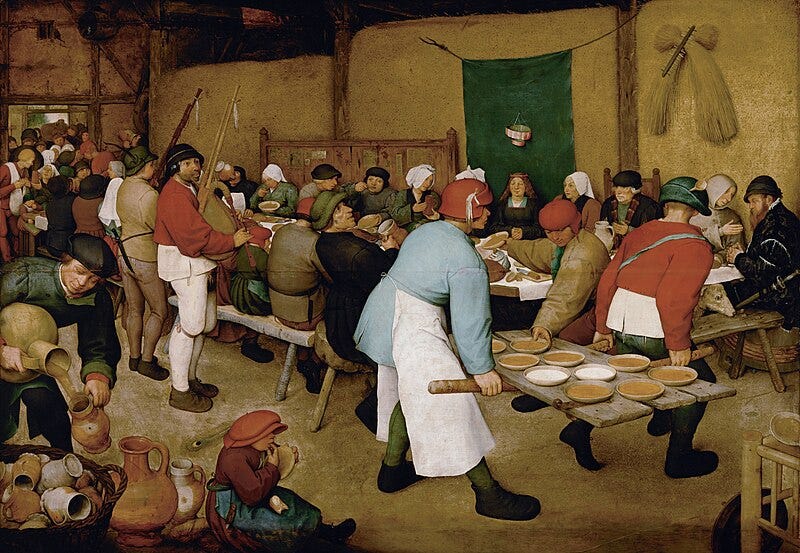The War for Attachment
The End of Rational Delusion and the Return of Organic Order
This post continues a series exploring how the liberal-rationalist discourse of capitalist modernity is breaking down in the post-liberal era. (See here1 for a definition of terms.) This essay argues that we should not merely embrace this moment as post-liberal but as post-rational, and seize the opportunity it offers to reclaim the instincts, traditions, and deep attachments that liberalism has spent centuries suppressing. Rejecting the illegitimate dominance of rationalism does not mean a retreat into irrationalism, but a movement toward something older, truer, and more real: a worldview that takes seriously the legitimacy of love, prejudice, and particularity, without seeking the approval of liberal discourse.
*
In previous essays (1 2), I argued that the conservative movement has been hollowed out by its capitulation to liberal-rationalist terms of debate. Once conservatism accepted the premise that all claims must be justified through abstract, universalist language, it forfeited its own vital foundations: instinct, tradition, and custom (what Edmund Burke called prejudice). This collapse of discursive immunity left conservatism unable to resist the managerial juggernaut of liberalism. However, we are now witnessing the breakdown of that discourse — and with it, the possibility of something new.
Liberal-rationalist discourse functions by stripping language of its affective content, reducing all claims to neutral, procedural, and universal terms.2 Its natural adversary is the language of strong feeling: love and prejudice. Both bind us to particular things — people, places, customs — and both provoke protective boundaries. Love draws lines of attachment; prejudice draws lines of exclusion. But modern liberalism, which demands universal interchangeability, pathologizes both. Love for particular things must always be reinterpreted in inclusive, universalist terms, while negative expressions of attachment (“I hate x”), are effectively outlawed.
The ban on “prejudiced” language is presented as a moral necessity to prevent harm. But this is a pretext. It’s really about power.
The real reason such language is policed is that it is dangerous to liberalism. Public expressions of deep attachment — especially those directed toward particular, non-universal objects like nation, people, or tradition — threaten to undermine the rationalist framework. Expressions of prejudice, meanwhile, are a means of preserving group cohesion, by demarcating in-group/out-group boundaries. The suppression of prejudice is therefore not truly about preventing harm; it’s about dismantling a primordial mechanism of social cohesion that liberalism cannot tolerate — and which, if revived, would utterly destabilize its power.
This is another dimension of replacism, the historical phenomenon diagnosed by Renaud Camus. Replacism is not merely a demographic reality; it is also linguistic and cultural. If people are to be interchangeable, then the language that binds them to particular communities, places, and customs must be dismantled. Any form of speech that signals a strong sense of belonging — anything affective, rooted, or distinctive — becomes intolerable. The language of attachment is thus systematically suppressed, leaving only the cold, managerial language of rationalism to govern human affairs. This is not a byproduct of liberalism, but a deliberate objective. A social order founded on universal interchangeability requires the destruction of language that sustains particularity.
This impulse is as old as utopian rationalism itself. William Godwin, one of its earliest prophets, insisted that human beings should ignore the claims of family and attachment. “I ought to prefer no human being to another, because that being is my father, my wife or my son,” he wrote. This is not merely an eccentric opinion, but the logical conclusion of a worldview that regards all human attachments as arbitrary and illegitimate unless they conform to a universal standard. Love must be flattened into benevolence; loyalty must be reduced to abstract fairness; and prejudice — the intuitive faculty that defends attachment — must be treated as a moral crime. In the place of love and loyalty, liberalism offers procedural neutrality. In the place of particularity, it offers the void.
Most of us instinctively step away from the precipice when rationalist logic approaches our most intimate relations. We know, at some primal level, that it is grotesque to treat family, love, or belonging in purely impersonal, procedural terms. More than this, the language of attachment – I love x, I hate y – comes naturally to everyone. But it is systematically drummed out of us in Western education, where “rising above” such instinctive judgments is presented as the hallmark of intelligence and moral sophistication. The ability to suppress the language of prejudice and affect, and to adopt the neutral, dispassionate vocabulary of liberal rationalism, becomes a prerequisite for upward social mobility. Those who struggle or refuse to do so are branded as low-status, low-intelligence, or socially suspect.
Western education has become a sorting mechanism which divides society into two castes. Those who master the language of neutrality and proceduralism are fast-tracked for roles in the managerial, media, or political elite. Those who cannot, or will not, relinquish the language of attachment are consigned to the social periphery. The result is a profound and tragic irony: liberalism, which claims to be universalist, actively suppresses the most universal human impulses — love, attachment, and prejudice — while elevating a narrow linguistic code that is alien to ordinary human life. What it calls “intelligence” is, in reality, more like submission: a willingness to sublimate one’s natural attachments in favour of abstract, impersonal reasoning. What it calls “ignorance” is simply the refusal to abandon the language of love and hate, of particularity and belonging.
In this way, liberalism disguises its caste structure as a moral hierarchy. The very capacity to feel deeply, to love passionately, or to defend one’s own becomes a mark of low status: while those who have trained themselves to suppress these things rise effortlessly through the social ranks.
The perception that emotionally charged language — especially prejudice — is crude or unintelligent is a product of liberal rationalist conditioning. But prejudice is not irrational; it is pre-rational. It operates at the level of instinct, attachment, and inherited tradition — precisely the things that liberal rationalism seeks to eradicate.
So, despite generations of suppression, the language of love and prejudice stubbornly persists. Ordinary people still say I love my country or I don’t like those people without any abstract justification — because it is natural to do so. Such language is not learned in a seminar room; it flows spontaneously from the ancient, affective springs of human life. This is why liberalism finds it so threatening. The language of attachment is a permanent reminder that rationalist discourse is not natural, but a brittle ideological construct: one that can only maintain itself through constant repression and social engineering.

Even the more perceptive liberals have glimpsed this problem. The philosopher Leo Strauss, for example, recognized that virtues like loyalty, courage, and love of one’s own are not derived from rational principles but from pre-rational attachments — and that without them, society would collapse. Liberalism, despite its universalist pretensions, can only exist parasitically: it consumes the residual social capital of pre-liberal civilization while simultaneously dismantling it. The moment that stock is depleted, liberalism itself begins to disintegrate.
This is why liberalism, far from being a universal destiny, is actually a grotesque historical aberration. In the long arc of human history, rationalist-liberal discourse is not the rule but the exception. It emerged only recently, as a by-product of Enlightenment thought in the eighteenth century, and only became dominant in the West after the 1960s, when a rising managerial class finally succeeded in stripping society of its inherited structure. But it has never been stable, nor has it ever generated anything of its own. It survives only by parasitizing the old virtues of family, nation, and custom — even as it works to destroy them.
This is also why liberalism has never been consistently applied. Even the most liberal societies do not treat all groups equally in practice, nor do they ever achieve equal outcomes — because attachment and particularity cannot be abolished. Differences in culture, biology, and social capital persist regardless of ideology, constantly reasserting themselves. Liberalism’s imagined universalism is therefore a colossal delusion. Its theoretical logic is infinite, but its practical reality is strictly bounded. And its collapse is inevitable.
What does collapse look like? Take a look around. Every society where liberal rationalism has achieved dominance now lies in ruin: collapsing birthrates, open borders, family breakdown, mental health epidemics, euthanasia, lawlessness and vagrancy in the streets. All of this follows inevitably from a worldview that despises attachment and sees love of one’s own as pathological. In the long run, the logic of liberalism leads not merely to social decay but to existential obliteration. The nations that accept it are dissolved; the peoples that embrace it are replaced.
The final and bitterest irony is that the very virtues that sustain human life — attachment, loyalty, prejudice — are the very things liberalism has condemned as primitive. And the hollowed-out civilization that results from this error is not merely impoverished; it is doomed. Its demographic collapse is not accidental, but the direct, mechanistic consequence of liberalism’s hatred of life’s natural bonds. In its final stages, liberalism does not simply fail — it actively engineers the conditions for its own annihilation. And in doing so, it carries entire peoples down with it.
All of this proceeds from liberal rationalism’s refusal to face the truth of human nature. In reality, most human behaviour — including political behaviour — is not the product of rational calculation but of non-rational drives. These non-rational drives are not irrational; they simply operate beneath the level of conscious reasoning.
As James Burnham observed in The Machiavellians, this insight was given its most rigorous expression by the Italian polymath Vilfredo Pareto. Pareto recognized that human conduct is largely governed by what he called residues: deep-seated, instinctive patterns of behaviour rooted in attachment, loyalty, and group-preservation. Among the most powerful of these residues is group-persistence: the drive to sustain a family, tribe, city, or nation as an enduring and cohesive entity. Love of one’s own, pride in ancestry, religious devotion, and willingness to defend one’s group through force are all expressions of this residue. In essence, they are the pre-rational social cement that holds human groups together.
But Pareto also noted something equally significant: whenever human beings act on these residues, they have a powerful tendency to cloak their behaviour in rational justifications. He called these derivations. Derivations are the formal, logical explanations that individuals and societies offer to legitimize their instinctive behaviour — but they are never the true cause of it. The cause is always the residue: such as the deep, non-rational drive for group persistence. The derivation is merely a post-hoc rationalization.
This insight has catastrophic implications for liberal rationalism. Because if human social life is ultimately sustained by pre-rational residues — and not by abstract principles — then liberalism’s entire self-conception collapses. Liberalism imagines that society can be governed through pure rational discourse — that individuals can be stripped of their atavistic attachments and universalized through a shared ideological framework. But if Pareto is correct, this is impossible. People cannot simply reason their way into a universal humanity. Their group attachments — and the language that articulates them — are anchored in something far deeper than rationality.
And here lies the true horror of the liberal project. Liberal rationalism cannot simply coexist with residues of group-persistence: it must actively eradicate them. The very existence of these residues poses a threat to the liberal worldview. A man who says I love my country without justification, or who expresses visceral dislike for “the other”, is articulating a pre-rational claim. His attachment is not a matter of opinion, but an expression of deep social and psychological structure. To allow such language to persist is to accept the precedence of group-persistence — and this liberalism cannot tolerate.

This is why modern liberalism has become so aggressive in policing the language of attachment and prejudice. If someone says I love my nation, they are immediately asked to justify it — as though it were some aberrant pathology requiring explanation. If someone expresses distaste for a foreign culture, they are condemned and socially sanctioned — even when their reaction is entirely intuitive, natural, and real. In each case, what is really being policed is not simply the content of their speech but the residue it expresses.
And this is the point of Pareto’s insight: when liberalism attacks prejudicial language, it is not merely attacking opinion. It is attacking the pre-rational structures that allow groups to persist. In effect, it is engaged in a war against the substrates that allow a people to exist as a coherent, self-sustaining entity – linguistically, culturally, and in the end biologically.
This war on attachment is not simply an abstraction. It is lethal. Because the primary function of residues is to perpetuate the group: to protect it, ensure its cohesion, and sustain its generational continuity. If you destroy the residues, the group itself will eventually die. And so the suppression of attachment-based language — love of nation, pride of ancestry, preference for one’s own — is not simply a matter of ideological policing. It is a form of conceptual genocide. It is the deliberate dismantling of the psychological and social architecture that allows certain groups to exist over time.
And here we must be absolutely clear: this is not merely an attack on language. It is an attack on the possibility of group survival itself. When you suppress a people’s ability to speak in terms of attachment, particularity, and preference, you also suppress their ability to reproduce themselves — first culturally and socially, and finally biologically. They become atomized, deracinated individuals who no longer possess a shared language of belonging. The only discourse that remains for them is the universalist abstraction of liberalism, which renders all attachments illegitimate.
This is not a metaphor. It is a mechanism. And it has measurable demographic consequences. Because the suppression of residues is ultimately the suppression of group persistence itself, we find — with astonishing regularity — that wherever liberal rationalism has achieved cultural dominance, birthrates collapse, social trust disintegrates, and the population begins to disappear. This is not accidental; it is the direct and predictable consequence of a worldview that pathologizes attachment.
The open border, the broken home, the collapsing birthrate, the atomized city — these are not policy failures but inevitable outcomes of a doctrine that hates attachment and loves abstraction. Liberalism is not failing; it is succeeding. It is accomplishing precisely what is in its nature to do: dissolve every residue that sustains group persistence, reduce the population to a condition of total interchangeability, and facilitate complete managerial control.
If residues are indeed the foundation of group-persistence — and if liberalism seeks to suppress those residues — then population replacement is the logical endpoint of the liberal project. Not because anyone necessarily intended it, but because the mechanism is part of the ideological architecture. By eliminating the epistemic conditions that sustain group persistence, liberalism inevitably creates the preconditions for the group’s dissolution.
The death of affective language precedes the death of the group itself. Wittgenstein’s concept of language games, and the role they play in constituting reality, suggests that destroying a language game does not merely silence speech — it helps destroy the lived reality that speech sustains. This suggests that attempts to police and eventually proscribe the language of affect and prejudice ultimately tend to deny the existence of the group which gives them their voice.3
Without the ability to speak in terms of attachment, rootedness, or preference, a group loses the ability to reproduce itself in any meaningful way. It is reduced to a collection of individuals whose only permitted discourse is universalist abstraction. This is the ideological precondition for interchangeability and replacism. For when the language of love and prejudice is extinguished, the group that produced it becomes a phantom: unarticulated, unthinkable, and therefore incapable of reproducing itself. It is not murdered outright but by conceptual suffocation. The erasure of attachment-based language therefore precedes cultural death — and cultural death, in turn, precedes demographic extinction.
And here Burnham and Pareto’s insight reaches its zenith. What liberal rationalism ultimately aims at is not simply the suppression of prejudice — it is the elimination of entire modes of human continuity. The dream of a universal humanity without distinctions, attachments, or exclusions is — when taken to its logical conclusion — a form of demographic and cultural annihilation.
Liberalism is not simply flawed; it is suicidal. It is a doctrine of anti-life, whose ultimate consequence is to strip certain peoples of the means to perpetuate themselves.
The consequence is replacement. The mechanism is suppression. The target is the residue of group-persistence. And the name of the doctrine that justifies it all is liberalism.
In the end, liberalism finally reveals itself not merely as a flawed worldview, but a force of civilizational liquidation — a doctrinal machine that dissolves the social, cultural, and even biological foundations of any group that submits to it. Its demand for interchangeability, its war on affect, and its policing of language are not incidental features but the essential logic of its existence.
But liberal rationalism also contains the seed of its destruction. It is based on lies — that human nature can be reengineered, that residues can be eliminated, and that societies can be governed solely by abstract rational principles. These are unsustainable. The residues of group persistence will return. Already, there are signs of reassertion: the resurgence of populism, nationalism, and cultural reaction across the West. These are not political programmes but instinctual spasms of group persistence — the desperate gasps of a social body fighting to survive.
We stand in the midst of a great crisis. Liberal rationalism has brought the West to the brink of cultural, demographic, and even biological collapse. But if Pareto was right, then residues cannot be easily or quickly extinguished. They may be driven underground, but they will fight to resurface, sometimes erupting with volcanic force. The final question is whether the reassertion of residues will come in time to avert total annihilation — or whether it will be too late.
One thing, however, is certain. The future belongs to those who can reclaim the language of attachment and prejudice without apology. For only those who can say without justification that I love my people, and say without shame that I hate what threatens my people, will have the will to endure. And only those who understand that liberal rationalism is not a failed utopia but a mechanism of extinction will have the power to overcome it.
What comes next is neither irrationality nor a regression into chaos, but the return to a more organic and historically grounded way of relating to the world. Nietzsche saw this as the precondition for a new, aristocratic kind of thought: one rooted in life, hierarchy, and deep feeling rather than sterile abstractions. Following Nietzsche, Spengler also foresaw a world where the “steel-bright” illusions of rationalism would give way to something older, more visceral, and far more powerful.
We are now on the threshold of that change. Western elites are visibly decadent, exhausted, inadequate, and losing their grip. What happens next depends on whether the suppressed “residues” of Western civilization can reassert themselves.
We need a new elite which can marshal these forces to revitalize the West. And the first task is to speak again, without shame, the language of love and prejudice — for it is only through that language that we can find the will to survive.
If we do not speak it, we will perish.
The next part of this series will address what comes next. Rejoice, for it is coming soon.
These essays consider liberal rationalism as a mode of discourse which dominates the contemporary West. It is important to understand that liberal rationalism is not a neutral intellectual tradition or philosophy, but a hegemonic structure: a set of assumptions that shape what is considered to be legitimate thought and speech. While it may have emerged as an intellectual tool, from its inception it was also an instrument of progressive ideology: and, in the modern West, it has long since ossified into an epistemic framework that conditions all contemporary political debate.
There are exceptions, as when woke progressives express aversion towards whites, males, etc. However, as observed in the last essay, the paradigm of liberalism is that such expressions should be avoided. Nobody believes this more than establishment conservatives, who typically take progressives to task for failing to “live up” to this liberal ideal.
This is the fundamental argument against speech restrictions, particularly those concerning so-called “hate speech” laws, which is rarely (if ever made). I’ll return to this subject in another piece.




Thank you so much for your incredible writing. You connect so many ideas and help me understand things I’ve felt but couldn’t put into words. I’ve always thought that political correctness and “woke” language felt like a kind of spell—something like what magicians or lawyers use—but you’ve explained it in a way that really makes sense. I believe a big part of this whole situation is about controlling language and the stories we tell. Hopefully, what we’re seeing now is that control starting to loosen.